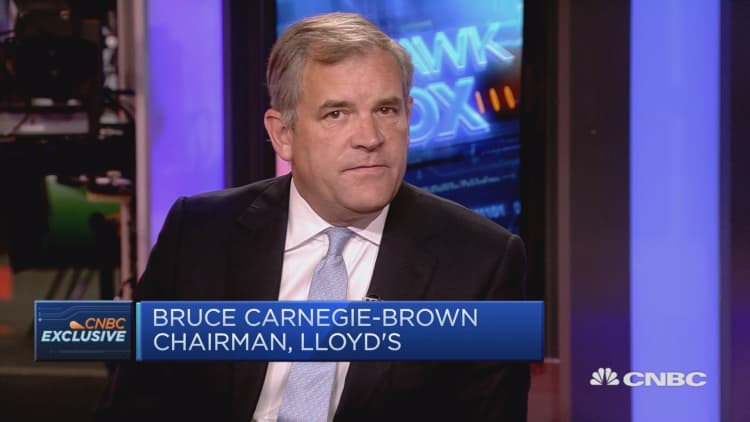
Man-made threats including market crashes, cybercrime and interstate conflicts are a bigger threat to economic output than natural disasters, according to a new survey from insurer Lloyd's.
These risks have an estimated annual impact of $320 billion of global gross domestic product (GDP) for the 279 cities in the survey. The insurance giant said they are a much bigger economic threat than hurricanes, floods, earthquakes and volcanoes.
The Lloyd's "City Risk Index," published Wednesday and created in collaboration with Cambridge University, measured the impact of 22 threats (both man-made and natural). The index showed that 279 major cities across the world — with a combined gross domestic product (GDP) of $35.4 trillion — risk losing on average $546.5 billion in economic output annually from all 22 threats. This comprises $320.1 billion to man-made risks and $226.4 billion to natural catastrophes.
The top threat is a market crash, which puts $103.33 billion of total GDP at risk, while the second biggest risk is interstate conflict (putting $80 billion of total GDP at risk) followed by tropical windstorms which are a $62.59 billion threat to total GDP. The rest of the risks in the top 10 included human pandemic, civil conflict, sovereign default, flood, earthquakes and commodity price shocks.
An increase in the risk posed by cybercrime was one of the major standouts of the survey, according to Lloyd's Chairman Bruce Carnegie-Brown.
"There's no doubt that cyber risk is escalating and when we last did this report three years ago it didn't appear (in the index) and it's probably the fastest developing risk globally and I don't think we yet fully understand the extent of that risk," he told CNBC "Squawk Box Europe" Wednesday.
"We have a separate category (of risk) around interstate conflict but it's arguable that much of cyber risk is actually in interstate conflict rather than separately as a technology risk," he said.
Cities at risk
The report showed that the majority of the risk is concentrated in a few regions, with 10 cities facing a combined $126.8 billion in potential losses to economic output each year. Tokyo is the city with the most at risk ($24.31 billion) with the leading threat being an interstate conflict (due to its proximity to North Korea).
In second place, the leading threat to New York is a market crash with $14.83 billion at risk. In third, an estimated $13.27 billion of Manila's total GDP is at risk from a tropical windstorm. Taipei, Istanbul, Los Angeles, Shanghai and London are also in the top 10 from either man-made risks or natural ones.
"This is almost a quarter of total GDP at risk and more than the amount of GDP at risk in Africa, the Middle East and Latin America combined. This finding reflects the increasing concentration of wealth in certain geographic regions and, therefore, the vulnerability of the global economy to disruptive events," the report noted.
Carnegie-Brown told CNBC Wednesday that the index focuses on cities and showed their importance to the global economy.
"What stands out from the index is the importance of cities to the global economy. I think upward of 54 percent of the world's population now lives in cities and they account for 80 percent of global domestic product, economic output around the world," he said.


